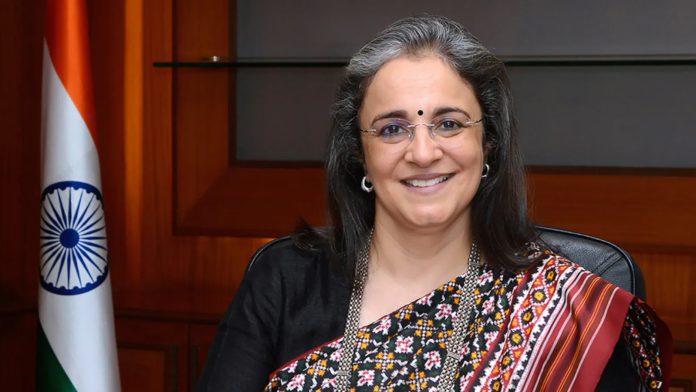By K Raveendran
The allegations of misconduct and irregularities surrounding SEBI chairperson Madhabi Puri Buch’s tenure have cast a long shadow over the institution, shaking public confidence and raising questions about the integrity of India’s financial regulatory system. This development gains even more significance in the light of the Supreme Court’s 2018 observation on institutional credibility, which emphasized the crucial role that individuals at the helm play in maintaining public trust. The situation now presents a significant test, both for SEBI as a regulatory body and for the government, which appears to be caught between shielding Buch and addressing growing demands for accountability.
Madhabi Puri Buch, who became the first woman to head SEBI, has faced increasing scrutiny over alleged procedural violations and ethical lapses during her time in office. These allegations have been compounded by claims that the government is taking extraordinary measures to protect her from facing proper investigation. The longer these concerns remain unaddressed, the more SEBI’s credibility as a neutral and competent regulator is eroded, a situation that risks further damaging investor confidence in India’s financial markets.
It is impossible to ignore the Supreme Court’s wise counsel on institutional credibility. In 2018, the Court underscored the importance of individuals who run institutions, stating that credibility is maintained not by external reports or accusations but by the ethical standards and integrity of those in charge. This notion is directly applicable to the current crisis engulfing SEBI. The continuous protection of Buch by the government, combined with the growing number of irregularities alleged under her watch, presents a fundamental challenge to this principle. The longer she stays in office without facing proper scrutiny, the more SEBI risks being perceived as a compromised institution, vulnerable to influence and incapable of independent functioning.
The credibility issue surrounding Buch’s tenure is not just about her individual actions but also about the broader implications for governance. SEBI, as the regulator responsible for overseeing the country’s vast financial markets, plays an essential role in ensuring transparency, fairness, and accountability. Any compromise in the leadership of such a vital institution sends ripples across the entire economy. The question of whether Buch can effectively carry out her duties, given the serious allegations against her, has been raised both within India and internationally, with many suggesting that the government’s protective stance only adds to the suspicion.
The opposition Congress party has continued to intensify the demand for the SEBI chief’s resignation and proper investigation into her misdeeds. The party demanded a full parliamentary probe into the accusations against Buch, arguing that the public has a right to know the extent of the alleged misconduct and the potential damage done to SEBI’s reputation. K.C. Venugopal, who heads the Public Accounts Committee (PAC), an influential parliamentary body, could soon summon Buch to answer questions directly related to her actions as SEBI chairperson.
A parliamentary probe, if it proceeds, would bring unprecedented scrutiny to SEBI’s internal workings and Buch’s leadership. For Buch, facing such a probe would be far from a routine examination. The allegations against her, ranging from procedural lapses in regulatory approvals to questionable decisions in handling sensitive cases, have placed her in a precarious position. While her defenders in the government argue that these allegations are politically motivated or overblown, the lack of transparency and accountability only makes matters worse for both her and SEBI.
Congress’s focus on this issue reflects a broader concern that Buch’s leadership could fundamentally compromise SEBI’s ability to act as an impartial regulator. Rahul Gandhi has been particularly vocal about the need for Buch to be held accountable for her actions, stating that SEBI’s credibility, which has already taken a significant hit, cannot be restored as long as she remains in office without facing proper investigation. The push for a parliamentary probe is not just about SEBI, but about reinforcing the principle that regulatory bodies in India must operate free from political influence or protection.
The current situation with SEBI reveals a situation in which the leadership appears to be failing the institution and is only compounding the crisis of public confidence. SEBI’s reputation has been built on its ability to regulate India’s fast-growing financial markets effectively, ensuring that investors can operate in a transparent and fair environment. However, as more allegations surface against Buch, SEBI’s standing is being called into question. Investors, both domestic and international, may start to doubt SEBI’s ability to enforce its regulations impartially, especially if it appears that its own leadership is tainted by misconduct. The longer the government delays taking definitive action, the more difficult it will be for SEBI to regain its lost credibility.
At the heart of this controversy is not just Buch’s leadership, but also the government’s role in protecting her. The political dimension of this crisis is undeniable, as the government’s reluctance to allow for an independent probe into the allegations has led to widespread speculation. While Buch’s defenders argue that the accusations are exaggerated and politically driven, there is a growing perception that SEBI’s independence is being compromised. This perception is exacerbated by the government’s efforts to shield her, which only fuel suspicions of undue influence in regulatory matters.
A parliamentary probe could provide the transparency that has been sorely lacking, offering the public and investors alike the opportunity to see whether SEBI’s leadership is up to the task of maintaining the institution’s integrity. For the government, allowing such a probe might be the only way to restore faith in both SEBI and its commitment to regulatory independence. (IPA


